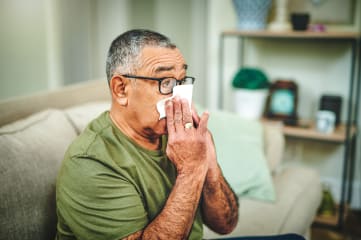Respiratory Syncytial Virus (RSV) Infection: Care Instructions
Overview

Respiratory syncytial virus (RSV) infection is a viral illness that causes symptoms like those of a bad cold, such as a runny nose, a sore throat, coughing, and wheezing. RSV spreads easily. It’s most common in babies and young children, but anyone can get it. And you can get it more than once.
RSV infection often goes away in 1 to 2 weeks. Most people who have it get better with home care. But your doctor may give you medicines to help you feel better.
RSV usually doesn’t cause major health problems. But sometimes it can cause pneumonia and trouble breathing. If this happens, you may need treatment in the hospital.
Follow-up care is a key part of your treatment and safety. Be sure to make and go to all appointments, and call your doctor or nurse advice line (811 in most provinces and territories) if you are having problems. It's also a good idea to know your test results and keep a list of the medicines you take.
How can you care for yourself at home?
If your doctor prescribed medicines, take them exactly as directed.
- Ask your doctor if you can take an over-the-counter pain medicine, such as acetaminophen (Tylenol), ibuprofen (Advil, Motrin), or naproxen (Aleve). Be safe with medicines. Read and follow all instructions on the label.
- Drink plenty of fluids. If you have kidney, heart, or liver disease and have to limit fluids, talk with your doctor before you increase the amount of fluids you drink.
- Try not to smoke. Smoking can make RSV worse. If you need help quitting, talk to your doctor about stop-smoking programs and medicines. These can increase your chances of quitting for good.
- If the skin around your nose and lips becomes sore, put some petroleum jelly (such as Vaseline) on the area.
- To ease coughing:
- Suck on cough drops or plain, hard candy.
- Raise your head at night with an extra pillow. This may help you rest if coughing keeps you awake.
- Try an over-the-counter cough or cold medicine. Before you use cough and cold medicines, check the label. These medicines may not be safe for people with certain health problems.
- Be careful when taking over-the-counter cold or influenza (flu) medicines and Tylenol at the same time. Many of these medicines have acetaminophen, which is Tylenol. Read the labels to make sure that you are not taking more than the recommended dose. Too much acetaminophen (Tylenol) can be harmful.
- Take steps to avoid spreading RSV. Be extra careful around people who can get very sick from RSV. This includes babies, older adults, and people who have weak immune systems, have long-term health problems, or live in nursing homes.
- Wash your hands often, and keep your hands away from your face.
- Cover your mouth when you cough or sneeze. If you can, cough or sneeze into the bend of your elbow, not your hands.
- Stay home from school, work, and other public places until you are feeling better.
- Wear a high-quality mask when you’re around other people. It can help stop the spread of the virus.
- Clean often-touched items, like doorknobs, light switches, and remote controls. And don’t share personal items like cups or utensils.
- Ask your healthcare provider if the RSV vaccine is right for you. You can get the RSV vaccine for free if you are age 75 years or older. You can also get this vaccine if you are age 60 years or older and live in a continuing care or supportive living facility. If you are not eligible to get the RSV vaccine for free, you may be able to pay for it at a pharmacy. If you had a dose of RSV vaccine in the past, you do not need another dose.
- Getting the RSV vaccine during pregnancy can help keep your baby from getting infected. Most adults age 60 and older can get the vaccine. You can also ask people you’re in close contact with to talk to their doctor about the RSV vaccine.
When should you call for help?
Call 911 anytime you think you may need emergency care. For example, call if:
- You have severe trouble breathing.
- You have severe chest pain.
Call your doctor or nurse advice line now or seek immediate medical care if:
- You have trouble breathing.
- You have pain or pressure in your chest or belly.
- You have a fever or cough that returns after getting better.
- You have health conditions that are getting worse.
Watch closely for changes in your health, and be sure to contact your doctor or nurse advice line if:
- You do not get better as expected.
- You are having a problem with your medicine.
